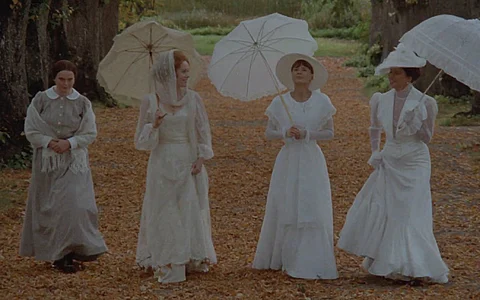
- Reviews
- Power List 2024
- Cannes 2024
- In-Depth Stories
- Web Stories
- News
- FC Lists
- Interviews
- Features
- FC SpecialsFC Specials

Ingmar Bergman's Cries and Whispers is a film of moments, of fleeting silences and flourishing colours. It's a film of themes, allegories and Biblical symbolism. Finally, it is a film reduced to misplaced, superfluous words by "edgy film students" like myself. So indulge me and my broken thoughts, if you will.
There is a certain distance one feels from the film – from the characters' lives, their pains. It feels like a melancholic, violent wave hitting the shore, as I stand watching from my balcony. A voyeur to the sea's torment. This, I opine, is no accident, no mistake, no "flaw". No, it was the effect of the careful manipulation of a practising impressionist functioning at his optimum – the characters feel distant and cold, so we're made to feel the same. Bergman knows well the effects that complete surrender and immersion would have had on the audience. It would only polarise the viewers, misdirect the conversation to a point of no return, maybe even make it miserably hard to watch, akin to Tarkovsky's Sacrifice. Cries and Whispers functions within the same thematic domain as that film. There is a dominating presence of god in both the auteurs' works, a quest so internal to the filmmakers that it is best amplified within their works. Here, Agnes's cancer is directly compared with a holy sacrifice, and her death, with that of a martyr giving up her life for "their sins". Bergman presents a critical reading of this belief by presenting the anguish and undeterred guilt that follows death. Their lives, as promised by the death of Agnes, never experience prosperity, never make their pains go away.
Let us look beyond the Biblical allusions of the film for a minute, and talk of a theme much more fundamental to the film: motherhood. All the sisters are bitter, cold and broken in some way, even Anna. They are all deeply wounded by the psychological misdoings of their mother: in the flashback scene, we briefly hear Agnes talk of her mother. From this brief delineation of the past, we understand that her mother was as tormented by the boredom and monotony of her life in the estate. This points us to another interesting and rather whimsical way to look at the house: as a house marred by death, destruction and melancholia. Placed in another film, this would make for a great location for a horror film.
I'm not sure I fully understand the film yet. Cries and Whispers is the kind of film meant to be watched over and over again until the largest of reds and bleakest of whites have been infused with meaning that only you could bring as an individual entity – and that is the film's biggest strength. I'm not even sure I like the film. Maybe I'm just trying to mask my indifference with words. Or maybe I'm a little overwhelmed. I guess we'll have to see tomorrow morning.